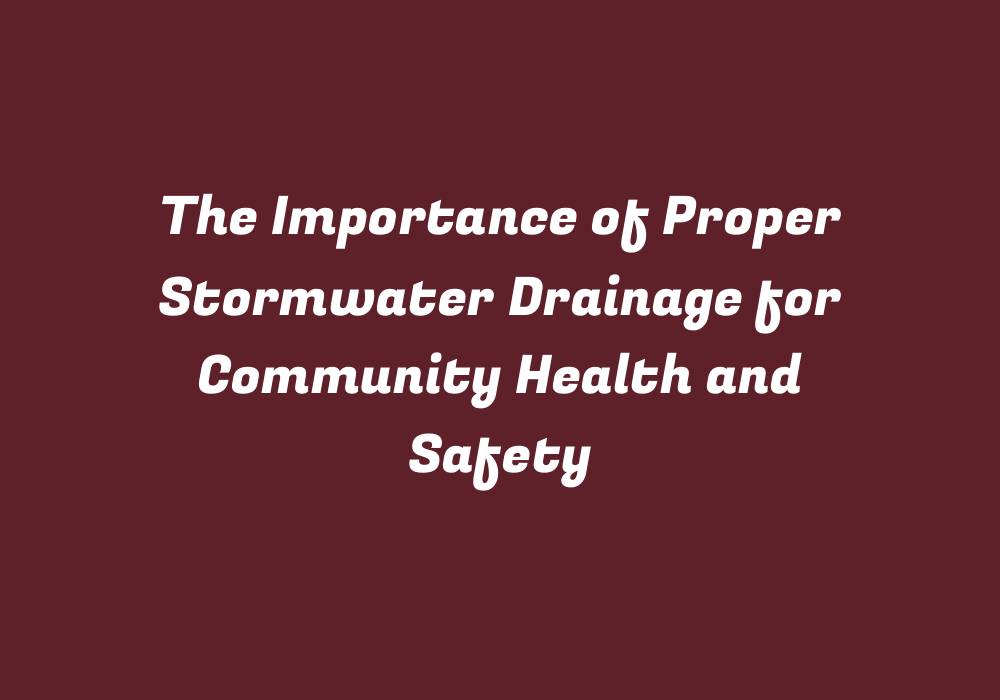Introduction
Stormwater drainage is a critical aspect of any community’s infrastructure. It plays an essential role in maintaining public health and safety by effectively managing rainfall and reducing the potential risks associated with excess water. Poor stormwater management can result in disastrous consequences, including flooding, erosion, water contamination, and even loss of life. In this article, we will explore the significance of proper stormwater drainage for community health and safety.
Proper Drainage Reduces Flood Risks
One of the primary benefits of efficient stormwater management is its ability to minimize flood risks. During heavy rainfall events, runoff can overwhelm natural waterways, leading to excess water accumulation in communities. This accumulated water may result in property damage, displacement of people from their homes, and potential fatalities due to flash floods. Proper drainage systems can help alleviate these risks by effectively directing rainwater away from urban areas, reducing the likelihood of flooding incidents.
Prevention of Water Contamination
Another vital aspect of stormwater management is its impact on water quality. Poorly maintained drainage systems can cause pollutants to enter water bodies, leading to environmental degradation and potential health hazards for the community. By properly managing and treating rainwater, it becomes less likely that contaminants will find their way into natural ecosystems. This helps maintain the overall cleanliness of water sources and ensures that they remain safe for use in various activities such as drinking, swimming, fishing, and agriculture.
Mitigating Erosion
Proper drainage systems also help to protect soil from erosion. Excess rainwater runoff can cause the topsoil layer to wash away over time, leading to land degradation and a loss of productive agricultural land. By ensuring that stormwater is properly directed and managed, communities can safeguard their valuable topsoil resources and maintain healthy ecosystems.
Enhancing Community Health
A well-functioning stormwater management system contributes to the overall health and well-being of community members. Effective drainage systems reduce the risk of waterborne diseases by minimizing the chances of contaminants entering the water supply. Additionally, these systems play a crucial role in maintaining safe living conditions for residents during natural disasters such as hurricanes and floods.
Encouraging Urban Green Spaces
Proper stormwater management also helps to create a more attractive and livable environment through the development of urban green spaces. These areas can serve various purposes, including recreational activities, wildlife habitats, and pollution control. By integrating greenery into their drainage systems, communities can benefit from a range of environmental, social, and economic advantages while effectively managing stormwater runoff.
Improving Economic Opportunities
Investing in advanced stormwater management technologies not only benefits the community’s health and safety but also contributes to its overall economic well-being. With a reliable drainage system, local businesses can continue operations during severe weather events, reducing the risk of financial losses and enabling communities to bounce back more quickly from natural disasters. Additionally, these investments attract investment capital and support long-term economic growth for cities and towns.
Conclusion
Proper stormwater drainage is an essential aspect of community infrastructure that plays a significant role in maintaining public health and safety. By addressing issues such as flood risks, water contamination, erosion control, and urban green spaces, effective stormwater management systems ensure that communities can thrive both environmentally and economically. As our cities continue to grow, it is vital for governments and local authorities to prioritize these drainage solutions to create a more resilient and sustainable future for generations to come.
